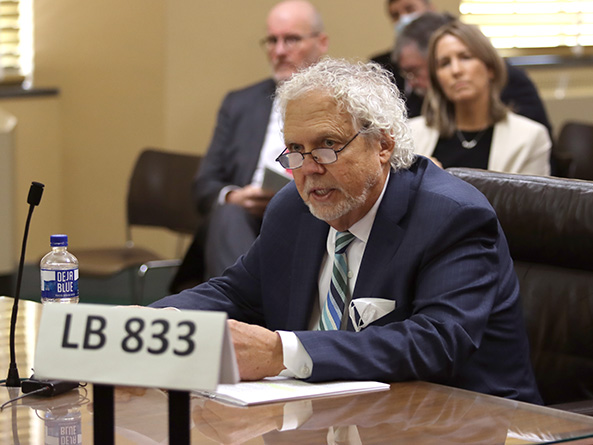Statute of limitations on child sexual assault discussed
The Judiciary Committee heard testimony Jan. 21 on a bill that would change the statute of limitations for certain child sexual assault cases.

LB833, introduced by Omaha Sen. Rich Pahls, would remove the existing time limitation on a civil action taken against a private third party in cases of sexual assault of a child. Provisions of the bill would not apply to cases already time barred under the statute of limitations.
Under current state law, a victim of child sexual assault has until age 33 to pursue a civil action against a third party. But the average age of a child sexual assault victim who comes forward, Pahls said, is 52.
“This will enable victims to pursue bad actors on their terms and it will act as a deterrent to any institution who might seek to put their own interests above the safety of children,” Pahls said.
Kathryn Robb testified in support of the bill on behalf of Child USAdvocacy. Robb said victims of child sexual abuse may repress memories of their abuse, intentionally or unintentionally, in order to survive. This is in part, she said, due to the high levels of cortisol and adrenaline a victim experiences during their abuse, which can lead to memory loss.
A number of different events may trigger recall of childhood sexual assault abuse later in life, she said, including the death of a parent or having a child reach the age that the survivor was when their abuse started.
“Most [experts] argue that it’s also the depression, the fear [and] the shame that really silences [victims],” Robb said. “So why should sexual predators be protected by the passage of time while victims suffer in perpetuity?”
Also in support of the bill was Shaun Dougherty, president of the Survivors Network of those Abused by Priests and a survivor of child sexual assault. Most victims, Dougherty said, will never come forward due to the statute of limitations out of fear that their accusations could lead to allegations that they are slandering their abuser.
Debra Dappen, who identified as a survivor of child sexual abuse, also testified in support of the bill on behalf of SNAP. Dappen said she was unsuccessful for 20 years in her attempts to file a police report against the man who raped her as a child.
“Due to the statute of limitations, he has never been publicly exposed or investigated and was able to die a free man,” she said. “Meanwhile, I’ve had to carry the burden of his crimes all these years, as all silenced victims do.”
Testifying in opposition to LB833 was Tom Venzor, who spoke on behalf of the Nebraska Catholic Conference. Venzor expressed concern that the bill would not apply to public institutions even though most child sexual assault cases occur outside of the church or other private institutions.
“Statutes of limitations serve a purpose for both parties,” Venzor said. “Plaintiffs are entitled to a reasonable period of time to raise their claims and, likewise, defendants should be entitled to a reasonable sense of finality to avoid defending against difficult-to-prove allegations.”
Coleen Nielsen also testified in opposition to LB833 on behalf of the Nebraska Insurance Information Service and the Nebraska Insurance Federation. She said that statutes of limitation are put in place to protect individuals against unfair litigation by requiring certain timeliness.
“A lawsuit brought against an entity can be extremely difficult if not impossible to defend,” Nielsen said. “Memories [can] fade, records can be destroyed – witnesses can be difficult to find, others may have become incapacitated or pass away.”
The committee took no immediate action on the bill.


